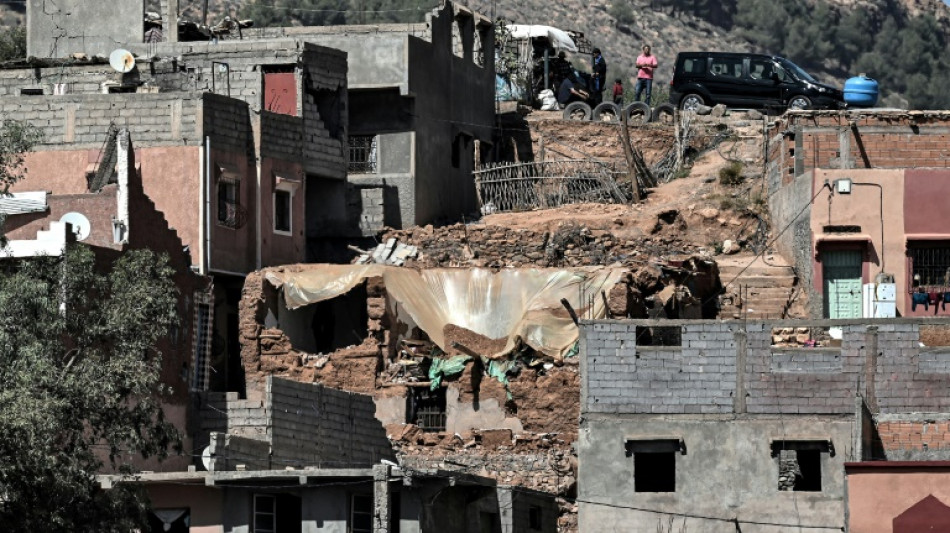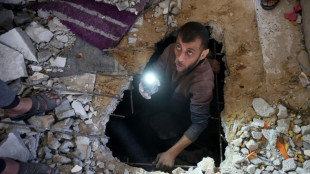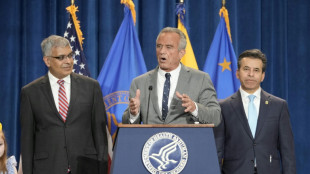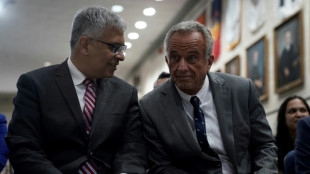
-
 Hamas says open to 5-year Gaza truce, one-time hostages release
Hamas says open to 5-year Gaza truce, one-time hostages release
-
Iran, US hold new round of high-stakes nuclear talks

-
 Up at dawn for front-row seat to history at Francis's funeral
Up at dawn for front-row seat to history at Francis's funeral
-
Pakistan ready to 'defend sovereignty' after India threats

-
 Huge crowds flock to Vatican for Pope Francis's funeral
Huge crowds flock to Vatican for Pope Francis's funeral
-
Xi says China must 'overcome' AI chip challenges

-
 Indian army says new exchange of gunfire with Pakistan
Indian army says new exchange of gunfire with Pakistan
-
Epstein accuser Virginia Giuffre takes own life in Australia: family

-
 Hundreds of buildings damaged, dozens injured in 6.3 Ecuador quake
Hundreds of buildings damaged, dozens injured in 6.3 Ecuador quake
-
India and Pakistan's Kashmir fallout hits economy too

-
 Francis's funeral to be grand farewell to 'pope of the poor'
Francis's funeral to be grand farewell to 'pope of the poor'
-
Pogacar faces defiant Evenepoel at Liege-Bastogne-Liege

-
 Chelsea eye great escape against Barcelona in Women's Champions League
Chelsea eye great escape against Barcelona in Women's Champions League
-
Iran, US to hold new round of high-level nuclear talks

-
 'Energy and effort' pay off for Reds as Blues' woes continue
'Energy and effort' pay off for Reds as Blues' woes continue
-
Albatross and closing birdie lift China's Liu to LPGA Chevron lead

-
 On the horizon? Wave of momentum for high seas treaty
On the horizon? Wave of momentum for high seas treaty
-
Top Mistakes to Avoid When Building Credit History

-
 Developing countries should fast-track US trade deals: World Bank president
Developing countries should fast-track US trade deals: World Bank president
-
Grizzlies' Morant 'doubtful' for must-win game 4 v Thunder

-
 Trump in Rome for pope funeral in first foreign trip of new term
Trump in Rome for pope funeral in first foreign trip of new term
-
Trump says Russia-Ukraine deal 'very close' after new Kremlin talks

-
 US rookies lead PGA pairs event with McIlroy and Lowry in hunt
US rookies lead PGA pairs event with McIlroy and Lowry in hunt
-
Trump tariff promises get a reality check

-
 Warriors coach Kerr 'relatively optimistic' injured Butler will play game 3
Warriors coach Kerr 'relatively optimistic' injured Butler will play game 3
-
Postecoglou hopes 'Stonecutter's Credo' can inspire Spurs

-
 PSG lose unbeaten Ligue 1 record ahead of Arsenal showdown
PSG lose unbeaten Ligue 1 record ahead of Arsenal showdown
-
Venezuela accuses El Salvador president of 'human trafficking'

-
 Own goal takes Sundowns to African final against Pyramids
Own goal takes Sundowns to African final against Pyramids
-
Scores of buildings damaged, 20 injured in Ecuador quake

-
 US stocks extend rally as market eyes busy calendar next week
US stocks extend rally as market eyes busy calendar next week
-
Pope's death triggers surge of disinformation he fought against

-
 Rovanpera takes control of Rally Islas Canarias
Rovanpera takes control of Rally Islas Canarias
-
Zelensky insists Crimea is Ukrainian as US envoy meets Putin

-
 Patel and Mendis help Sunrisers beat Kings in Dhoni's 400th T20
Patel and Mendis help Sunrisers beat Kings in Dhoni's 400th T20
-
Copa del Rey ref statements 'unacceptable': Real Madrid after boycotting final build-up

-
 Insurance CEO's accused killer pleads not guilty to federal murder charges
Insurance CEO's accused killer pleads not guilty to federal murder charges
-
FBI arrests Wisconsin judge for shielding undocumented migrant

-
 Brazil ex-president Collor de Mello jailed for corruption
Brazil ex-president Collor de Mello jailed for corruption
-
Zelensky insists Crimea 'belongs' to Ukraine as US envoy meets Putin

-
 Real Madrid boycott Copa del Rey build-up over referee complaints
Real Madrid boycott Copa del Rey build-up over referee complaints
-
Trinidad and Tobago votes for parliament, PM, with opposition in lead

-
 IMF chief hails 'constructive' Spring Meetings held under tariff uncertainty
IMF chief hails 'constructive' Spring Meetings held under tariff uncertainty
-
Iran FM Araghchi in Oman ahead of nuclear talks with US

-
 Dozens of buildings destroyed, 20 injured in Ecuador quake
Dozens of buildings destroyed, 20 injured in Ecuador quake
-
Young Barca must 'enjoy' Real Madrid Copa final fight: Flick

-
 Pakistan and India border closure separates families
Pakistan and India border closure separates families
-
Brazil's Bolsonaro 'stable' after post-surgery setback

-
 Catholics in secular Cuba hail Francis as 'bridge'
Catholics in secular Cuba hail Francis as 'bridge'
-
US envoy Witkoff, Putin discuss 'possibility' of direct Russia-Ukraine talks


'Everything comes back': Morocco quake leaves mental scars
When Khadija Temera, a survivor of Morocco's devastating earthquake, was sent to a psychiatrist on Tuesday, she was just one of a hundred newly traumatised patients who would be seen within 24 hours.
The powerful quake last Friday killed more than 2,900 people, most of them in remote villages of the High Atlas Mountains.
Beyond the physical devastation, soldiers and aid workers say it is becoming increasing clear that many of the survivors are facing severe mental suffering.
"The most important thing is that we are alive," Temera says, her henna-stained fingers fiddling with a piece of paper, her eyes swollen with tears.
But now she wants to "heal her heart", and on Tuesday she had her first consultation with a psychiatrist, seeking balm for the trauma inflicted by the quake.
She had first gone to see a regular doctor for hypertension.
But Moroccan troops in the area quickly referred her to the psychiatrist, who said he had seen around a hundred patients since the previous day out of the 500 who came to the field hospital in Asni, around 90 kilometres (55 miles) south of the tourist hub of Marrakesh.
Flashbacks from the fateful day continue to haunt Temera: of stairs collapsing and trapping her and the nine members of her family before they could be rescued.
"I've been awake ever since, I can't fall asleep -- as soon as I lie down everything comes back," said the 68-year-old from the village of Lareb.
- 'Acute stress' -
Next to her on a bench, a mute woman was also waiting for a consultation, her hands clasped across her chest and breathing heavily.
She has lost both her children.
After her comes the turn of a man in his thirties, his eyes red from crying.
Of the thousands injured in the powerful earthquake, "some were not only wounded and bruised in their flesh, they were also often 'bereaved', having lost their homes", said Adil Akanour, the only psychiatrist at the makeshift hospital, which was opened to the press on Tuesday.
Meanwhile villagers in more isolated hamlets, which have remained inaccessible, told AFP of their isolation and the absence of aid.
Survivors find themselves in a "state of acute stress with symptoms, often physical at first", Akanour said, adding that dizziness, palpitations, headaches and abdominal pain can be symptoms that "hide" a psychological problem.
According to the World Health Organization, nearly everyone who experiences such an emergency will suffer some psychological problems which, in most cases, will fade with time.
- 'There's nothing left' -
The separation of families, insecurity, loss of livelihoods and disruption of social contacts are all potential psychological problems, according to the UN organisation, which recommends urgent care to prevent the development of post-traumatic stress disorders.
The 6.8-magnitude quake that struck on September 8 was the most powerful ever recorded in the kingdom, with the provisional toll of 2,900 people dead likely to rise.
Entire villages were swallowed up, and with them the lives of hundreds of modest families.
Thousands of people were left homeless, the majority now living alone in makeshift tents or, for a few such as Mouhamed El Makhconi, sheltering in genuine windproof tents provided by the interior ministry.
"I was the only one providing for my family," the 60-year old said with a resigned, toothless smile.
He did so by selling jewellery to tourists heading to the summits of the High Atlas mountain range that dominates the landscape.
But now "there's nothing left" of his ground-floor apartment, leaving him and his eight-member family destitute.
"I haven't even got a dirham on me," he sighs, sitting outside the tent. He had to be provided with everything from blankets to glasses.
Adding to his desperation are the sounds of the earthquake that remain resonant in his memory.
He too cannot sleep, saying he can still feel the tremors and the waves of fear that went through his body.
But El Makhconi has not consulted a psychiatrist, largely because he needs to sort out his diabetes first.
His grandchildren have not been examined either. They are still terrified at times and miss their toys, including the bendir, a much-loved percussion instrument.
J.Williams--AMWN


